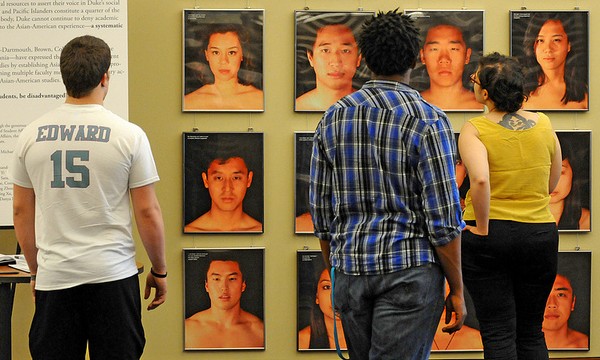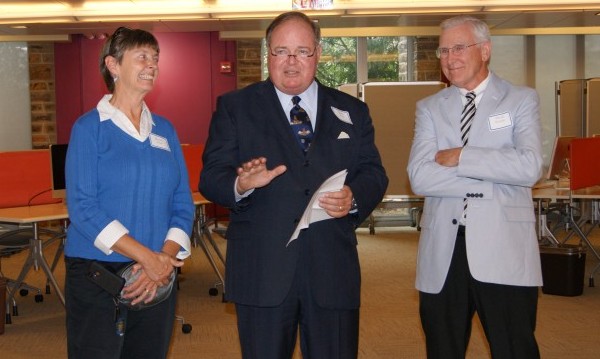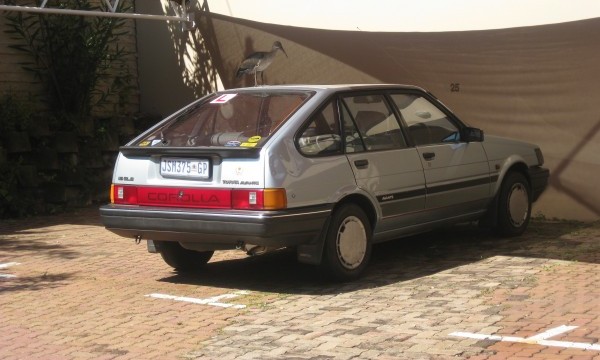
On September 29, 2012, Duke University launched the most significant fundraising and alumni engagement campaign in its history. The comprehensive $3.25 billion campaign, “Duke Forward: Partnering for the Future,” will support strategic priorities across the university, with a goal of raising $45 million for the Duke University Libraries.
This undertaking comes at an important time in the Libraries’ history. Over the past decade, we have undergone a dramatic physical and technological transformation, becoming one of the most popular destinations on campus. Now, thanks to the largest philanthropic gift in our history from trustee and campaign co-chair David M. Rubenstein (’70), we are about to renovate our world-class special collections library and complete the final phase of the Perkins Project.
The Libraries have always represented the intellectual and social center of Duke, bridging every element of the Duke experience from teaching and research to tradition and community. Across two campuses and the Duke Marine Lab, students and faculty gather in our libraries to exchange ideas, explore our collections, participate in cultural events, and experiment with innovative tools that enrich teaching and learning.
In its relatively short history, Duke has built one of the top research library systems in the country. As our prominence and reputation continue to grow, the whole university will benefit. Here’s a look at our plan for moving Duke forward.
Spaces for Study and Community
Every eight seconds, someone walks into a Duke University library. Over the past decade, the Libraries have undergone a renovation and expansion that have greatly enhanced the research support and gathering space we provide for these 21st-century students and scholars.
Over the next few years, we’ll renovate the newly renamed David M. Rubenstein Rare Book & Manuscript Library, reimagining this important space to make it easier for scholars, graduate students, and undergraduates to utilize the primary resources so essential to their work. Undergraduate research is a signature part of the Duke experience. More than half our students pursue a faculty-mentored research project, and they often rely on the rich special collections and expert assistance of the Rubenstein Library and its staff. We’ll create an expansive research room, reconfigure and renew spaces to facilitate both independent research and the collaborative exploration of questions and exchange of ideas.
When the renovation is complete, the Rubenstein Library promises to be one of the crown jewels of Duke, as much a part of the complete Duke experience as the Chapel, Cameron Indoor Stadium, and the Sarah P. Duke Gardens.

Building Distinguished Collections
The backbone of every great library is the strength of its unique collections. At Duke, the Rubenstein Rare Book & Manuscript Library contains 20 centuries of history and culture, including one of the top three collections of Walt Whitman’s manuscripts, distinctive history of medicine holdings, powerful oral histories from the Jim Crow South, and the largest collection of modern economists’ papers in the world, including nine Nobel Prize winners.
Collections of this caliber transform disciplines by facilitating archival research previously impossible, attract visiting scholars and top faculty whose work depends on the richness of the Libraries’ resources, open eyes to historical events and debates, and establish the university as a leader in critical fields. That kind of face-to-face encounter with primary documents and artifacts is what original research is all about.
Philanthropic support during the Duke Forward campaign will help us take advantage of opportunities to add primary materials and expand collections in important areas that align with Duke’s academic and research priorities. We’ll also build on our historically strong foundational print collections, those unique and high-profile holdings that distinguish Duke from other research universities.
Technology for Faster, Easier, Smarter Research
Every five seconds, someone visits our library website. The internet has become the primary way people find and use information. That’s why we’re investing staff and resources in a range of tools and technologies, from mobile apps to digital mapping, expanding our ability to accommodate the new ways our faculty and students teach and learn.

Philanthropic investments in our technical infrastructure and in enhancing staff expertise can help us migrate print materials to digital formats, improve our capacity to archive and share data, and collaborate with instructors on innovative ways to achieve their teaching goals.
Developing our digital collections and services will also help us meet growing demands for managing large data sets, visualizing complex statistical information, and developing mobile interfaces. By continually exploring and testing new technologies, we can maintain the Duke University Libraries’ role as IT leaders in academia.
Resident Experts and Innovators
Our librarians and skilled staff provide invaluable service to the Duke community, answering over 115,000 reference questions a year (virtually and in-person) and leading more than 600 presentations and training sessions. They’re accomplished specialists versed not only in their particular academic fields, but also in how best to find, organize, preserve, and share the wealth of material available in today’s information-driven society. Our 35 research librarians, with expertise in topics ranging from astrophysics and anthropology to statistics and zoology, provide specialized research support to faculty, staff, and students. Our scholarly communications director, a renowned expert on copyright, intellectual property and scholarly publishing, advises faculty, administrators, and students about related issues and best practices. And the experts in our conservation lab, one of the best of its kind, work meticulously to extend the life of our holdings, ensuring that knowledge can be passed on to the next generation.
As our collections and services grow to support Duke’s priority research areas, we’ll need to recruit and retain talented and innovative librarians, technologists, and archivists who will help our students and faculty blaze new paths in research.
Programs that Educate and Engage
Whenever you visit a Duke library, you are guaranteed to find something new and interesting—even if you only came in search of a book or cup of coffee. Every year, the Libraries host more than 100 public events, including workshops, exhibits, book talks, symposia, film screenings, music performances, award ceremonies, lectures, and the largest student-organized social event at Duke—the Library Party. These events highlight our inspiring collections, showcase student and faculty creative work, and foster conversation between the academic community and the general public.

As our event and exhibition capabilities expand with the Rubenstein Library renovation, we will need to increase support for public programs and outreach activities. The result will be an even more welcoming, inviting, and stimulating library, one that the entire Duke community can be proud of. A great library is one of the purest expressions of a university’s spirit. Support for public programming will ensure that Duke’s Libraries are not only sanctuaries of quiet study and scholarly discovery, but also places of inspiration, conversation, and delight.
Your Gifts Make It Possible
Meeting the needs of almost 15,000 students, some 1,800 faculty, and more than 30,000 employees of a major research university is challenging work. And unlike many private research libraries, we pride ourselves on being open to the public.
Just as communities depend on their libraries, so do we depend on our community for ongoing support. Your gifts help us provide the highest level of service to our students, faculty, and the many outside researchers who use our collections, advancing the university’s research and teaching missions.
The great social reformer Henry Ward Beecher once said, “A library is not a luxury but one of the necessities of life.” Naturally, a lot of librarians would agree with him. But so would the legions of Dukies who have walked through our doors and emerged with the research and critical thinking skills that will last them a lifetime. Support for the Libraries through the Duke Forward campaign will help us advance the university’s highest academic priorities and prepare today’s forward-thinkers to make a meaningful difference in the world.

See also:
Duke University Libraries Giving Website







